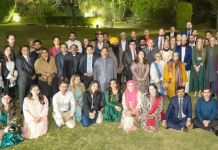Experts at the roundtable highlighted the multidimensional nature of the climate-security nexus, emphasizing that climate change is not only a traditional security threat but also poses economic and social challenges. Competition for resources, particularly water, was identified as a significant security concern, and the need to connect the dots between security and climate was emphasized
DNA
Islamabad: The Civil Society Coalition for Climate Change (CSCCC), with the support from United States Institute of Peace (USIP) and the United Arab Emirates Embassy to Pakistan, hosted a roundtable discussion as part of its pre-COP28 preparations on the interplay between climate change and security. Titled “The Arc of Vulnerability: Climate-Security Nexus,” this event brought together distinguished experts, academic, civil society actors, and stakeholders to explore the complex and multifaceted issues surrounding the nexus. The roundtable delved into various dimensions of vulnerability, ranging from the mountainous regions to coastal communities, with a focus on representing the subnational perspective.
Aisha Khan, Chief Executive CSCCC opened the session with welcome remarks, and reiterated the need for sustained engagement with diverse stakeholders for interdisciplinary and integrated approach in policy planning.
During the keynote speech, Amir Khan Goraya, Assistant Resident Representative at the UNDP highlighted that the devastating floods in 2022 served as stark reminders of the nation’s vulnerability to climate change, prompting a growing awareness among the population. However, bridging the gap between awareness and effective action remains a challenge that needs focused attention. He encouraged Civil society organizations (CSOs) to play a crucial role in advocacy, raising awareness, working with the government, and building community resilience.
Experts at the roundtable highlighted the multidimensional nature of the climate-security nexus, emphasizing that climate change is not only a traditional security threat but also poses economic and social challenges. Competition for resources, particularly water, was identified as a significant security concern, and the need to connect the dots between security and climate was emphasized.
The discussion moved towards necessary reforms, including the integration of climate change into national security policies. The roundtable emphasized the importance of developing a coherent approach to climate change at both the vertical and horizontal levels of governance. Institutional reforms, collaborative efforts across government departments, and mainstreaming climate change into various sectors were seen as vital steps in addressing climate change effectively.
Participants emphasized the need for accountability, ownership, and the enforcement of climate-related legislation. They called for greater collaboration between government and development sectors, with a focus on aligning projects with climate resilience and sustainability. Climate change was viewed as a development issue, and it was suggested that policies and legislation should reflect this perspective.
The discussion also highlighted the importance of accurate data collection, better data sharing, and enhanced sensitization of communities. It was noted that sensitization should extend beyond awareness to create a degree of readiness and preparedness in the face of climate-related challenges.
The roundtable was concluded by Ambassador Nadeem Riyaz, President Institute of Regional Studies (IRS) with a call for strengthening accountability and transparency mechanisms in climate governance, with an emphasis on addressing climate change not only as a global challenge but also a local and community-level concern.
…

















